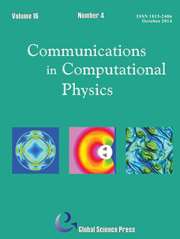Crossref Citations
This article has been cited by the following publications. This list is generated based on data provided by
Crossref.
Liu, Yang
Peng, Xiaodong
Zhou, Wugen
Liu, Bo
and
Gerndt, Andreas
2018.
Template-Based 3D Reconstruction of Non-rigid Deformable Object from Monocular Video.
3D Research,
Vol. 9,
Issue. 2,
Pawar, Aishwarya
Zhang, Yongjie Jessica
Anitescu, Cosmin
and
Rabczuk, Timon
2019.
Joint image segmentation and registration based on a dynamic level set approach using truncated hierarchical B-splines.
Computers & Mathematics with Applications,
Vol. 78,
Issue. 10,
p.
3250.
Li, Dejian
Li, Shaoli
and
Yuan, Weiqi
2020.
Positional deviation detection of silicone caps on FPCB.
Circuit World,
Vol. 47,
Issue. 1,
p.
23.
Zhang, Jin
and
Lancioni, Giovanni
2020.
Constrained Linear Curvature Image Registration Model and Its Numerical Algorithm.
Mathematical Problems in Engineering,
Vol. 2020,
Issue. ,
p.
1.
Yang, Shaodi
Zhao, Yuqian
Liao, Miao
and
Zhang, Fan
2021.
An Unsupervised Learning-Based Multi-Organ Registration Method for 3D Abdominal CT Images.
Sensors,
Vol. 21,
Issue. 18,
p.
6254.
Rouwane, Ali
Bouclier, Robin
Passieux, Jean-Charles
and
Périé, Jean-Noël
2021.
Adjusting fictitious domain parameters for fairly priced image-based modeling: Application to the regularization of Digital Image Correlation.
Computer Methods in Applied Mechanics and Engineering,
Vol. 373,
Issue. ,
p.
113507.
Yang, Shao-di
Zhao, Yu-qian
Zhang, Fan
Liao, Miao
Yang, Zhen
Wang, Yan-jin
and
Yu, Ling-li
2021.
An efficient two-step multi-organ registration on abdominal CT via deep-learning based segmentation.
Biomedical Signal Processing and Control,
Vol. 70,
Issue. ,
p.
103027.
Vallez, Noelia
Bueno, Gloria
Deniz, Oscar
and
Blanco, Saul
2022.
Diffeomorphic transforms for data augmentation of highly variable shape and texture objects.
Computer Methods and Programs in Biomedicine,
Vol. 219,
Issue. ,
p.
106775.
Rouwane, Ali
Bouclier, Robin
Passieux, Jean-Charles
and
Périé, Jean-Noël
2022.
Architecture-Driven Digital Image Correlation Technique (ADDICT) for the measurement of sub-cellular kinematic fields in speckle-free cellular materials.
International Journal of Solids and Structures,
Vol. 234-235,
Issue. ,
p.
111223.
Li, Haifeng
Guo, Weihong
Liu, Jun
Cui, Li
and
Xie, Dongxing
2022.
Image Segmentation with Adaptive Spatial Priors from Joint Registration.
SIAM Journal on Imaging Sciences,
Vol. 15,
Issue. 3,
p.
1314.


